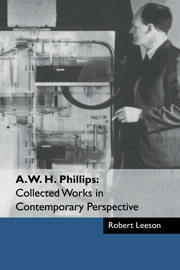Book contents
- Frontmatter
- Contents
- List of contributors
- Foreword by Arthur Brown
- Preface by Robert Leeson
- Part I Bill Phillips: Some Memories and Reflections
- Part II The Phillips Machine
- Part III Dynamic Stabilisation
- Part IV Econometrics
- 36 The Bill Phillips legacy of continuous time modelling and econometric model design
- 37 The published papers
- 38 The influence of A.W. Phillips on econometrics
- 39 An appreciation of A.W. Phillips
- 40 Some notes on the estimation of time-forms of reactions in interdependent dynamic systems
- 41 Cybernetics and the regulation of economic systems
- 42 The estimation of parameters in systems of stochastic differential equations
- 43 Estimation, regulation and prediction in interdependent dynamic systems
- 44 The Walras-Bowley Paper
- 45 Estimation of systems of difference equations with moving average disturbances
- 46 The estimation of continuous time models
- 47 Estimation in continuous time series models with autocorrelated disturbances
- 48 Efficient fitting of rational spectral density functions and transfer functions
- 49 The Lucas Critique: did Phillips make a comparable contribution?
- 50 Models for the control of economic fluctuations
- 51 Statistical estimation for the purpose of economic regulation
- 52 The last paper: a foreshadowing of the Lucas Critique?
- References
- Index of names
- Index of subjects
39 - An appreciation of A.W. Phillips
Published online by Cambridge University Press: 04 May 2010
- Frontmatter
- Contents
- List of contributors
- Foreword by Arthur Brown
- Preface by Robert Leeson
- Part I Bill Phillips: Some Memories and Reflections
- Part II The Phillips Machine
- Part III Dynamic Stabilisation
- Part IV Econometrics
- 36 The Bill Phillips legacy of continuous time modelling and econometric model design
- 37 The published papers
- 38 The influence of A.W. Phillips on econometrics
- 39 An appreciation of A.W. Phillips
- 40 Some notes on the estimation of time-forms of reactions in interdependent dynamic systems
- 41 Cybernetics and the regulation of economic systems
- 42 The estimation of parameters in systems of stochastic differential equations
- 43 Estimation, regulation and prediction in interdependent dynamic systems
- 44 The Walras-Bowley Paper
- 45 Estimation of systems of difference equations with moving average disturbances
- 46 The estimation of continuous time models
- 47 Estimation in continuous time series models with autocorrelated disturbances
- 48 Efficient fitting of rational spectral density functions and transfer functions
- 49 The Lucas Critique: did Phillips make a comparable contribution?
- 50 Models for the control of economic fluctuations
- 51 Statistical estimation for the purpose of economic regulation
- 52 The last paper: a foreshadowing of the Lucas Critique?
- References
- Index of names
- Index of subjects
Summary
Introduction
A way to honour A.W.H. Phillips is to describe the continuing influence of one of his enduring contributions to economic dynamics, his remarkable essay (chapter 42) about how discrete time observations can be used to restrict a continuous time linear model. That chapter precisely described what later came to be known as the problem of ‘aggregation over time ’, set forth a framework for studying it, and achieved useful characterisations of it. Chapter 42 partly shared the destiny of John F. Muth's (1960, 1961) papers about rational expectations. It took years for other economists to recognise how much more could be done with their ideas. In 1960, both Phillips and Muth were far ahead of most other economists in their understanding of the technicalities of time series analysis, and their appreciation of its potential applications to economic dynamics. Economists were not to take up the inquiry from the point left off by Phillips until the early 1970s, when Rex Bergstrom, Christopher Sims, Peter Phillips and others returned to the problem of aggregation over time.
Phillips' framework
Phillips assumed that observations on a vector of data are generated by a continuous time vector stochastic process with a rational spectral density matrix. Continuous time processes with rational spectral densities form a natural environment for studying the effects of aggregation over time, for several interrelated reasons that Phillips described and exploited.
- Type
- Chapter
- Information
- A. W. H. Phillips: Collected Works in Contemporary Perspective , pp. 365 - 369Publisher: Cambridge University PressPrint publication year: 2000
- 1
- Cited by



